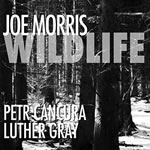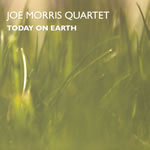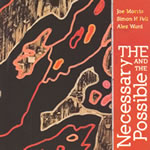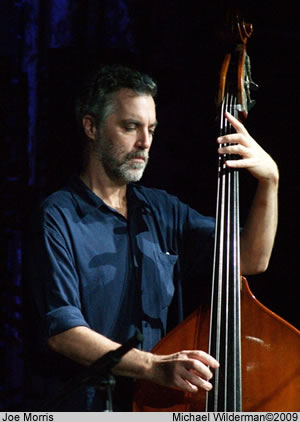Moment's Notice
Reviews of Recent Recordings
Joe Morris
Wildlife
Aum Fidelity AUM056
Joe Morris Quartet
Today On Earth
Aum Fidelity AUM058
Joe Morris + Simon H. Fell + Alex Ward
The Necessary and the Possible
Victo CD116



 Metaphor isn’t often the best way of thinking about music, but it isn’t always the worst. Sometimes it helps, if only subjectively, by offering a handle on work that otherwise resists. I’d been listening to Joe Morris’s music for a decade, and enjoying it in a slightly baffled way, impressed but stuck for words. The late ‘80s and early ‘90s saw the guitarist deliver a dozen strong, dark-toned albums – released on small or European labels such as Soul Note, No More, About Time, Leo and Morris’s own Riti imprint – each of them involved in their own sombre quiddities but impossible to gather up in that critical safety net called “style.” Morris recently sat an “Invisible Jukebox” in The Wire, the magazine’s version of a blindfold test. He did impressively well, but it prompted the thought that a fellow-musician could quite easily be played half a dozen Morris tracks – solo, trio, several quartets, even playing bass, as he has in recent years – and not quickly spot the continuity.
Metaphor isn’t often the best way of thinking about music, but it isn’t always the worst. Sometimes it helps, if only subjectively, by offering a handle on work that otherwise resists. I’d been listening to Joe Morris’s music for a decade, and enjoying it in a slightly baffled way, impressed but stuck for words. The late ‘80s and early ‘90s saw the guitarist deliver a dozen strong, dark-toned albums – released on small or European labels such as Soul Note, No More, About Time, Leo and Morris’s own Riti imprint – each of them involved in their own sombre quiddities but impossible to gather up in that critical safety net called “style.” Morris recently sat an “Invisible Jukebox” in The Wire, the magazine’s version of a blindfold test. He did impressively well, but it prompted the thought that a fellow-musician could quite easily be played half a dozen Morris tracks – solo, trio, several quartets, even playing bass, as he has in recent years – and not quickly spot the continuity.
Metaphor, or even more treacherously biography, sometimes comes along to help. In 1998, Morris released an album called A Cloud of Black Birds, with Mat Maneri, Chris Lightcap and Jerome Dupree. In a moving note, Morris explains that while attending a special school in Boston, as he did for a time, he spent much time alone watching starlings flock outside his window. It’s an overwhelmingly poignant image, but it also suggests a way into Morris’ music. This is where biography collides with autobiography, for I once spent an autumn, influenced by the work of biologist Frank Fraser Darling, trying to model the flight of rural starlings in Norfolk. Their movement – patterned, complex, only seemingly chaotic or random – also made a considerable impression on Morris, which somehow legitimizes the analogy. It holds up well. His music often seems to take no determined direction, as deliberately resistant to groove and harmonic organization as Derek Bailey’s, but it also obeys underlying logics, rarely repeated, each specific to an individual piece. In addition, the apparently drab coloration is an illusion. Close to, the music is as vividly spangled with detail as the birds’ plumage.
Whatever the context, and it might be the disciplined solo work (including tracks on mandolin and banjouke on the 1995 Leo masterpiece No Vertigo) or the quasi-chamber sound of Many Rings, with bassoonist Karen Borca, accordionist Andrea Parkins and saxophonist Rob Brown, released on Knitting Factory in 1999, or indeed the initially familiar freebop of the just-released Wildlife, on which he plays bass, Morris never settles into style. His bass playing has exercised fans and critics alike. At one level it seems an improbable gesture: if you can’t find a bass player you like (the apparently sympathetic contributions of William Parker, Nate McBride and Lightcap notwithstanding), then learn the instrument yourself. If Wildlife conjures up no predecessor more vividly than Ornette Coleman’s early 60s trio, that is because Morris on bass shares something of David Izenzon’s wonderfully declamatory sound. That proposes a further interesting connection, because on his main instrument – and contrary to some reports, Morris hasn’t ‘given up’ guitar in favor of the bass – he takes elements of another Ornette collaborator, James Blood Ulmer, not least Blood’s affection for drop-string tunings and subterranean drone effects. The small mystery here is why Morris feels the need to have a bass player at all, given his own broad range. Has he experimented with seven-string guitar, or a set-up like Charlie Hunter’s?
After a relatively quiet period, Morris has a number of recent releases, including his bold self-issued realization of notational experiments by composer and pianist Lowell Davidson, who died young in 1990 with just one unsatisfactory ESP-Disk recording to his name. Davidson’s background in biochemistry was important to the development of his work which seems to focus on the accretion of detail around very small musical incidents. Morris works the same way, producing initially discrete flocks of black notes which only over time start to cohere and suggest direction. In his note to Wildlife he stresses the importance for improvisers of playing from within specific knowledge but also using the improvisational moment to learn and to develop momentum and expression as ‘groove, melody and form’ spontaneously evolve.
The trio functions impressively as a unit. Luther Gray, known from work with Greg Burk, Taylor Ho Bynum and elsewhere, is the first voice heard on the record, with a long introduction to “Geomantic.” Saxophonist Petr Cancura is one of those rare souls who sounds as if he plays a single, tonally adjustable saxophone, rather than alternating alto and tenor. Some of his higher register playing is pointlessly overblown, but when he cleaves to the centre he is strikingly reminiscent of the Dewey Redman of the later 60s. The album’s four tracks are a touch slabby and unrelieved – “Crow” may have a more than incidental connection to some of the ideas on the 1998 record – but they repay careful listening, particularly at the bass end.
The music on Today On Earth is all composed by Morris. Altoist Jim Hobbs, bassist Timo Shanko and Gray complete the line-up. Here again, Morris seems to be involved in a process of sonic modeling, allowing small patterns of detail and trajectories of flight to build up, develop mass and resist inertia. “Imaginary Solutions” is a phrase probably best known as a definition of Pataphysics, but it works for Morris’s music as well, and the track rounds off an immensely thoughtful set with playful authority. Again, the studio sound (this time at 7A West in Charlestown, MA, rather than the Riti base in Guilford, CT) is resonantly unembellished and plain, with a lot of individual detail but more importantly a sense of group voice emerging with each successive track. The title track has an oddly wry and prosaic quality, which may have been intentional, but ‘Observer’ and ‘Embarrassment of Riches’ catch Morris at his riveting best.
There’s an impressive consistency of purpose, too, about the trio performance from FIMAV in 2008, documented as The Necessary and the Possible. Like Morris, clarinetist Alex Ward has dabbled with guitar as a second improvising voice, but here he is back in more familiar vein, and Simon H. Fell’s huge bass sound, which always seems to represent the armature to some vast, epic/abstract form that hasn’t been built yet, one of his own large-scale compositions, perhaps. Past experience of each others’ moves means that the set never sounds like a thrown-together festival encounter, the kind of occasion that often provides momentary excitements at the time but rarely stands up to repeated listening. The titles cast ‘improvise’ in a number of (French) tenses, which allows one to say that the music produced is pluperfect, with a sheer richness and idiosyncrasy of sound – neither Ward nor Fell would be difficult to pick up in blindfold audition – that contributes to a genuinely collaborative program.
Talking to Val Wilmer for As Serious as Your Life, Ornette said “A style happens when your phrasing hardens.” Joe Morris’s phrasing has never hardened, and his musical vision remains organic in outline and evolutionary in execution. Those birds aren’t ready to roost just yet.
–Brian Morton
